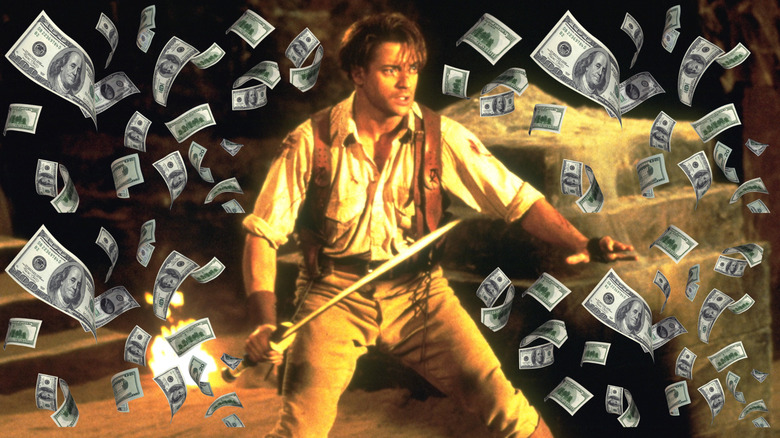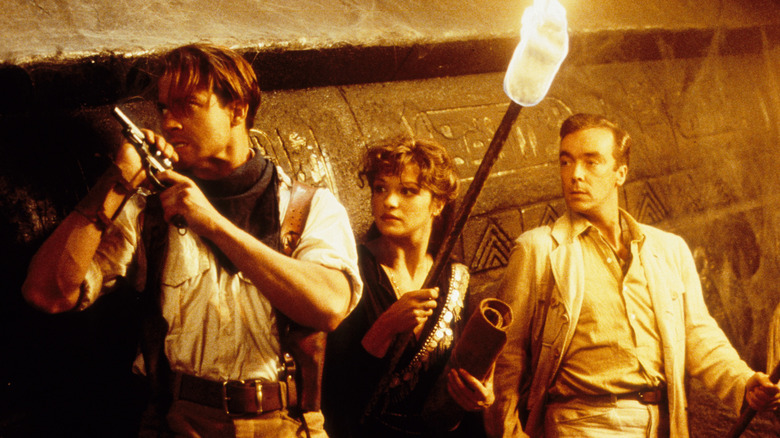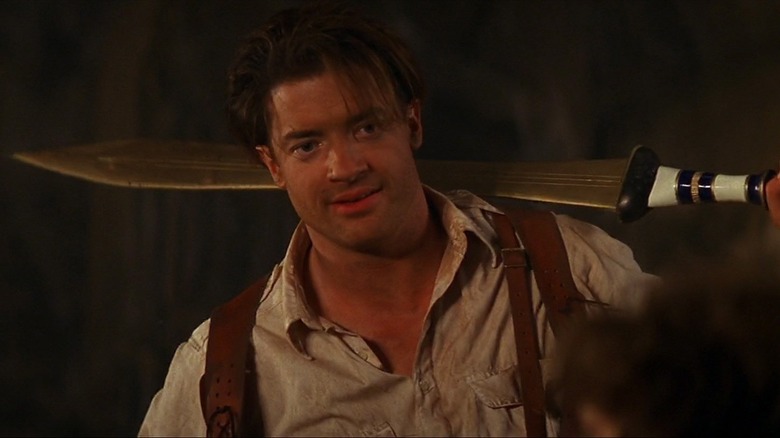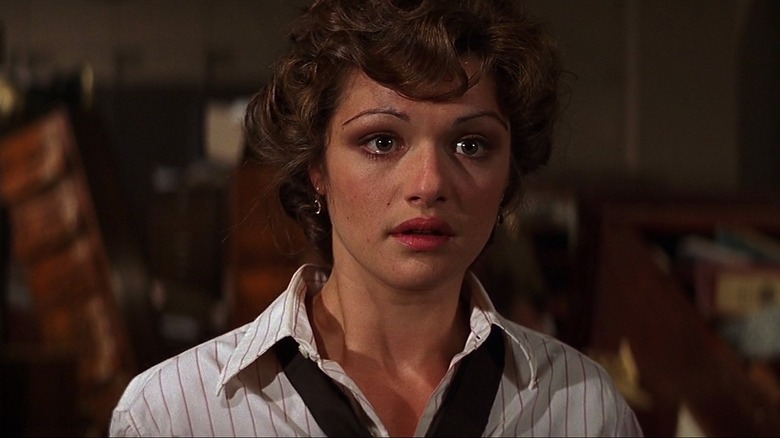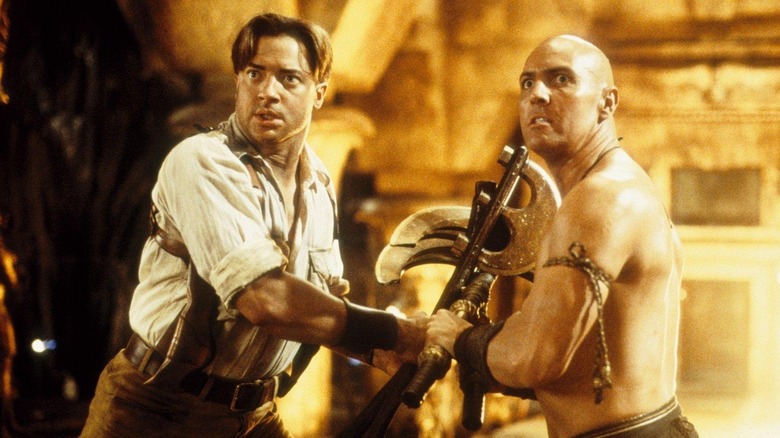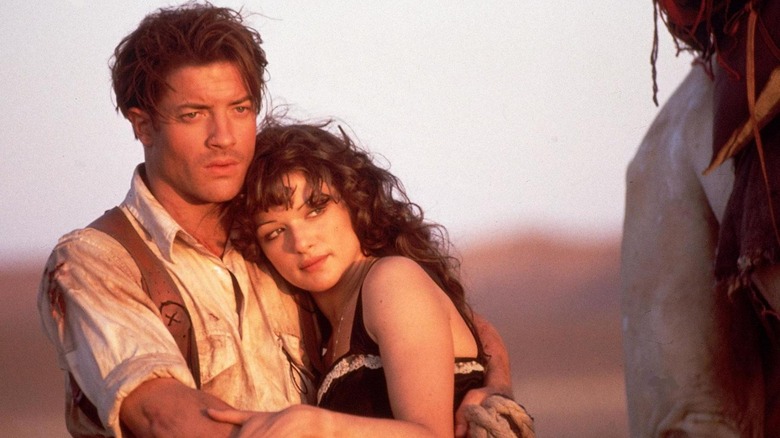25 Years Ago, Brendan Fraser's The Mummy Was A Box Office Smash (And The End Of An Era)
(Welcome to Tales from the Box Office, our column that examines box office miracles, disasters, and everything in between, as well as what we can learn from them.)
"'The Mummy' isn't really trying to scare you – it's trying to entertain you." This is what /Film's Chris Evangelista lovingly wrote of 1999's "The Mummy" in 2021. Directed by Stephen Sommers and starring Brendan Fraser as the swashbuckling Rick O'Connell, the film became a somewhat unexpected hit, so much so that it ended up being one of the highest-grossing films of 1999 overall. Critics were a bit mixed on it in its day. It was an action/adventure film, the likes of which Hollywood had released many times before. Be that as it may, a film designed purely to entertain (rather than to scare) resonated with audiences in a big way. It was pulpy lightning in a bottle.
Universal had, for years, been pursuing a possible reboot of "The Mummy" franchise, looking to use the 1932 monster movie classic as a springboard for a new horror franchise. Horror legends such as George A. Romero ("Night of the Living Dead"), Clive Barker ("Hellraiser"), and even Joe Dante ("Gremlins") spent time with the project. None of those versions saw the light of day. It was an unsuspecting director not from the world of genre filmmaking who got it across the finish line. In the process, he created more than just a reboot for the sake of a reboot; he crafted something that endured because both then and now — for different reasons — it reminds us of a bygone era.
In this week's Tales from the Box Office, we're looking back at "The Mummy" 25 years later. We'll go over the film's long journey through development hell, how Sommers cracked the code by going bigger, what happened when the movie hit theaters, what happened in the years that followed that made it feel so special in hindsight, and what lessons we can learn from it in the modern context.
The movie: The Mummy (1999)
This film traces its origins to the late '80s when producers James Jacks and Sean Daniel first had the idea to remake the Universal Monsters classic "The Mummy." From there, it was a trip straight to development hell. Universal had a lower-budget horror franchise in mind. Hence, filmmakers such as Romero and Barker spent time with the project only to be abandoned along the way.
It was a changing of the guard at Universal that paved the way for Sommers' version to take shape. Following the failure of "Babe: Pig in the City" and other misfires in 1998, Universal Pictures chairman and CEO Casey Silver was fired. ”The new group was more willing to go with a somewhat more inflated budget,” Jacks explained to Entertainment Weekly in 1999. Enter Stephen Sommers.
Having directed movies like "Deep Rising" and Disney's live-action "The Jungle Book" (not the Jon Favreau version that made nearly $1 billion at the box office), Sommers had experience, yes. But he had never made a movie on the scale he envisioned for "The Mummy." Again, the studio was interested in the property because they believed they could make a movie on the cheap. Speaking with Syfy Wire in 2023, Sommers recounted the origins of his blockbuster version of the classic monster tale:
"The guy before me was John Sayles and he was gonna write it and direct it. His script was actually good, but it all took place in Los Angeles because for nine years, they were basically trying to do a remake of the Boris Karloff Mummy. Which is ridiculous. I love the Boris Karloff [version], but I had no interest in remaking that movie...I go, 'Hell, I'll need $15 million just for the visual effects.' When I told the studio my vision of it, they went, 'Well, yeah, if you're gonna do a remake of the Boris Karloff Mummy, a low-budget horror movie with a guy wrapped in bandages, you're not gonna spend that much money. But if you're gonna do something [bigger, we'll give you more money].'"
Brendan Fraser becomes a blockbuster movie star
The film, as it exists, centers on Evelyn (Rachel Weisz), who reads from the Book of the Dead out loud and unintentionally awakens Imhotep, causing all hell to break loose and unleashing Arnold Vosloo's ancient Mummy on the world once again. It's a mix of light PG-13 horror with "Indiana Jones" influenced action/adventure storytelling. Brendan Fraser ended up getting his defining role as Rick O'Connell in the film, but only after other big stars of the day such as Tom Cruise were eyed by the studio.
"I wrote the character as a young swashbuckling Errol Flynn kind of hero. And Brendan is just like that. He even looks the part. Physically, he's perfect for the role," Sommers said to EW in 1999. Fraser, who was coming off of "George of the Jungle," put his body through hell to make "The Mummy," as well as its sequels. This was his biggest break to date and he wanted to look the part. It came at a cost but, credit where credit is due, Fraser looked every bit of the part. Vosloo, however, had to do a little bit of work to get into shape for his, at times, minimal wardrobe:
"They go, 'All right, here's your wardrobe.' It's, like, a G-string. I liked my beers; I had a bit of a paunch — still do. Steve [Sommers] told me afterwards that the wardrobe master said, 'We've got a problem. We've got a fat Mummy!' So in Morocco I was just running and walking and eating whatever it is they make you eat to lose weight. It all worked out."
Filming began in May of '98 and lasted about four months. Sommers was working with a whopping $80 million budget, which would be about $149 million in today's dollars. So yes, Universal was all-in on his vision for the film. Fortunately, that vision resonated with audiences in a big, bad way.
The financial journey of The Mummy
Universal had a fair amount of faith in "The Mummy" as they released it on the first weekend of May, which typically signals the start of the summer movie season. Given the budget, they were hoping to make a big splash. They were going to have to do so with mixed response from critics. To this day, the film carries a so-so 62% approval rating on Rotten Tomatoes. Even so, audiences were ready to embrace Brendan Fraser the action star, and Sommers' vision for an action-heavy take on a horror classic.
With little by way of direct competition in theaters, "The Mummy" sailed to the top of the charts with a $43.3 million opening weekend of May 7, 1999. It was the biggest, non-holiday May opening up to that point, as well as the ninth-biggest opening weekend of all time. In short, out of the gate, it was a huge success. It held onto the top spot for two consecutive weekends before surrendering the crown to the monster that was "Star Wars: The Phantom Menace." Be that as it may, Sommers' film held its own even against such stiff competition.
"The Mummy" finished its run with $157 million domestically to go with $260.5 million overseas (at a time when overseas markets weren't quite as robust as they are now), for a grand total of $417.6 million worldwide. Even against a sizable budget, there was no escaping its monster success. It finished as the sixth-biggest movie of the year, just behind Disney's "Tarzan" ($448.1 million) and well above eventual Best Picture winner "American Beauty" ($356.2 million).
That was just the tip of the iceberg. Thanks to the booming home video market, "The Mummy" also helped Universal top $1 billion in home video sales for the year, shipping 7 million VHS copies of the film, as well as 1 million DVD copies, per Billboard. It was the second-biggest DVD of the year behind only "The Matrix," which had itself a monster box office run in '99 as well.
The action/adventure movie falls out of favor
Naturally, the film's success spawned a franchise, with "The Mummy Returns" (which was nearly scrapped by Sommers) hitting theaters in 2001. It did even more business at the box office to the tune of $435 million worldwide against a bigger $98 million budget. It also inspired a spin-off in the form of 2002's "The Scorpion King," launching Dwayne "The Rock" Johnson's movie career. Unfortunately, this franchise's trajectory coincides with the slow death of the action/adventure film in Hollywood. In the years that followed, superheroes and other forms of blockbuster entertainment would take over.
The same year "The Scorpion King" came out, Sam Raimi's "Spider-Man" shattered box office records, becoming the first film ever to make $100 million on opening weekend, finishing with $821 million worldwide. That was the true point of no return. Disney would score a huge hit with "Pirates of the Caribbean: The Curse of the Black Pearl" in 2003, but even Disney has since had horrible failures in the action/adventure arena, with films like "John Carter," "The Lone Ranger," and last year's "Indiana Jones and the Dial of Destiny" ranking as huge flops. The hits in this genre in the 2000s are far outweighed by the misses.
Case in point? 2008's "The Mummy: The Tomb of the Dragon Emperor" made only $405 million worldwide against a gigantic $175 million budget, killing the franchise. Perhaps not coincidentally, that was the very same year that "Iron Man" made $585 million worldwide, paving the way for the Marvel Cinematic Universe. Hollywood has been chasing the cinematic universe train ever since.
To that end, Universal tried to relaunch the "Mummy" franchise with Tom Cruise in 2017. Intended to be the beginning of a shared universe dubbed the Dark Universe, the film killed the franchise before it ever got started. One of the only things resembling a big-budget action/adventure picture that has broken through in recent years was "Jumanji: Welcome to the Jungle" ($962 million worldwide) and its sequel "Jumanji: The Next Level" ($801 million worldwide). Outside of that, it's been tough sledding.
The lessons learned from The Mummy
"'The Mummy' feels like a lightning in a bottle scenario." That's what Chris Evangelista wrote in that same 2021 piece for /Film and, in some ways, that is the lesson here. On paper, there is nothing overly remarkable about this film. It borrows a lot from pre-existing franchises such as "Indiana Jones," pays homage to pulp adventures of a bygone era, and was a very, very loose remake of a classic horror film. Yet, 25 years removed, the love for this movie is palpable It's become a true millennial classic of sorts. That's probably why Fraser is down to return in a proposed "The Mummy 4."
Sommers may have captured lightning in a bottle, but it also wasn't an accident. His pitch provided a real reason for this movie to exist. He didn't just set out to remake the 1930s "Mummy" for modern times. Even though it was a far more expensive gamble, Universal bet on the right horse here. Even the filmmaker knew that capturing that same magic again would be almost impossible in "The Mummy Returns." And while that film has its fans, it's not quite so beloved as the original — not by a long shot.
In an era when Hollywood feels more desperate than ever to find something that works, it often seems like franchise films exist for the sake of existing. "The Mummy" is a tremendous reminder that having a reason to exist helps a great deal. Just look at Leigh Whannell's "The Invisible Man" from 2020 if you want another example of this same line of thinking playing out well. It runs in stark contrast to 2017's "The Mummy," which only existed to set up something that didn't even exist yet. That's the difference between then and now in a nutshell.
